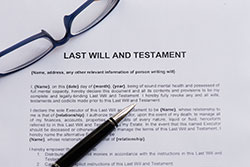|
Monday, February 15, 2016

In this computer age, when so many tasks are accomplished via the internet -- including banking, shopping, and important business communications -- it may seem logical to turn to the internet when creating a legal document such as a will . Certainly, there are several websites advertising how easy and inexpensive it is to do this. Nonetheless, most of us know that, while the internet can be a wonderful tool, it also contains a tremendous amount of erroneous, misleading, and even dangerous information.
In most cases, as with so many do-it-yourself projects, creating a will most often ends up being a more efficient, less expensive process if you engage the services of a qualified attorney. Just as most of us are not equipped to do our own plumbing repairs or automotive repairs, most of us do not have the background or experience to create our own legal documents, even with the help of written directions.
Situations that Require an Attorney for Will Creation
In certain cases, the need for an estate planning attorney is inarguable. These include situations in which:
- Your estate is large enough to make estate planning guidance necessary
- You want to disinherit your legal spouse
- You have concerns that someone may contest your will
- You worry that someone will claim your mind wasn't sound at the signing
Mistakes and Omissions
It has always been possible to write a will all by yourself, even before the advent of the typewriter, let alone the computer. Such a document, however, is unlikely to deal with the complexities of modern life. Many estate planning attorneys have seen, and often been asked to repair, wills that have mistakes or significant omissions. These experts have also become aware of situations in which the survivors of the deceased wind up in court, spending thousands of dollars to contest ambiguously worded or incomplete wills. Without legal guidance from a competent estate planning attorney, creating a "boxtop" will can result in tremendous financial and emotional risk.
Evidence that Online Wills Are Not Foolproof
Evidence that many other complications can arise when an individual creates a will using generalized online directions can be found in the following facts:
- Each state has its own rules (e.g. requiring differing numbers of disinterested party signatures)
- Even uncontested wills can remain in probate if not executed in an exacting fashion
- Estate planning attorneys find legal software programs inadequate
- Even legal websites themselves recommend bringing in an attorney in all but the very simplest cases
- Some legal websites provide inexpensive monthly legal consultations with attorneys to protect their client and themselves
Areas that Frequently Cause Problems
Self-constructed wills often become problematic when the testator:
- Names an executor who has no financial or legal knowledge
- Leaves a bequest to a pet (legally, you must leave the bequest to an appointed caretaker)
- Puts conditions on payouts to an that are difficult, or impossible, to enforce
- Makes unusual end-of-life decisions or puts living will information into the will
- Designates guardians for children, but neglects to name successor guardians
- Neglects to coordinate beneficiary designations where, for example, the will and insurance policy designations contradict one another
- Leaves funeral instructions into the will since the document will most likely not be read until after the funeral has taken place
- Leaves inexact or ambiguous instructions dealing with blended families
- Neglects to mention small items in the will which, though of small financial value, are meaningful to loved ones and may cause contention
In order to ensure that you leave your assets in the hands of those you wish, and to avoid leaving your loved ones with bitter disputes and expensive probate costs, it is always wise to consult with an experienced estate planning attorney when making a will. In this area, as in so many others, it is best, and safest, to make use of those with expertise in the field.
Monday, February 1, 2016
Many clients use beneficiary designations, and for good reason. Some significant assets, including life insurance policies, IRAs, retirement plans and even bank accounts, allow a beneficiary to be named. It’s free, it’s easy, and, when the owner dies, these assets are designed to be paid directly to the individual(s) named as beneficiary, outside of probate. But that is not always what happens. For example: - If your beneficiary is incapacitated when you die, the court will probably have to take control of the funds. That’s because most life insurance companies and other financial institutions will not knowingly pay to an incompetent person; they may insist on court supervision.
- If you name a minor as a beneficiary, you are probably setting up a court guardianship for the child. Life insurance companies and other financial institutions will not knowingly pay these funds directly to a minor, nor will they pay to another person for the child, not even to a parent. They do not want the potential liability and will usually require proof of a court-supervised guardianship.
- If you name “my estate” as beneficiary, the court will have to determine who that is. The funds will have to go through probate so they can be distributed along with your other assets.
- If your beneficiary dies before you (or you both die at the same time) and you have not named a secondary beneficiary, the proceeds will have to go through probate so they can be distributed with the rest of your assets.
Even if the funds are paid to the named beneficiary, things may not work out as the owner intended. For example: - Some people just cannot handle large sums of money. They may spend irresponsibly, be influenced by a spouse or friend, make bad investment choices, or lose the money to an ex-spouse or creditor. If the beneficiary receives a tax-deferred account, he/she may decide to “cash out” and negate your careful planning for continued long-term tax-deferred growth.
- If you name someone as a beneficiary with the “understanding” that the funds will be used to care for another or will be “held” until a later time, you have no guarantee that will happen. The money may just be too tempting.
- If the person you name as beneficiary is receiving government benefits (for example, a child or parent who requires special care), you could be jeopardizing their ability to continue to receive these benefits.
- If your estate is larger, your choice of beneficiary could limit your tax planning options, causing serious tax consequences for your family.
Beneficiary designations can be quite useful, but they need to be considered as part of an overall estate plan. Naming a trust as beneficiary will generally prevent the problems described above, and by bringing all of the client’s assets together under one plan, you can be sure that each beneficiary will receive the amount the client wants them to have—something that can be difficult to accomplish with multiple designations. Making a Retirement Plan Trust a designated beneficiary of a tax deferred retirement plan is an excellent choice to insure the beneficiaries (usually children) will not cash out the benefits and destroy the huge benefit of tax deferred growth and to acquire asset protection for the beneficiary in an accumulation trust. When meeting with a potential client, or reviewing a client’s existing plan, it is important for the estate planning professional to see all beneficiary designations. Correcting any designations now, and making sure the client understands them, will help to prevent significant future problems.
Monday, January 25, 2016

Things to Consider When Picking an Executor
The role of an executor is to effectuate a deceased person’s wishes as declared in a will after he or she has passed on. The executor’s responsibilities include the distribution of assets according to the will, the maintenance of assets until the will is settled, and the paying of estate bills and debts. An old joke says that you should choose an enemy to perform the task because it is such a thankless job, even though the executor may take a percentage of the estate’s assets as a fee. The following issues should be considered when choosing an executor for one's estate.
Competency: The executor of an estate will be going through financial and legal documents and transferring documents from the testator to the beneficiaries. If there are legal proceedings, the executor must make all necessary court appearances. There is no requirement that a testator have any financial or legal training, but familiarity with these areas does avoid the intimidation felt by lay people, and potentially saves money on professional fees.
Trustworthiness: The signature of an executor is equivalent to that of the testator of an estate. The executor has full control over all of an estate’s assets. He or she will be required to go through all of the papers of the deceased to confirm what assets are available to be distributed. The temptation to transfer assets into the executor's own name always exists, particularly when there is a large estate. It is important to choose a person with integrity who will resist this temptation. It makes sense to utilize an individual who is an heir to fill the role to alleviate this concern.
Availability: The work of collecting rents, maintaining property, and paying debts can take more than a few hours a week. Selecting an executor with significant obligations to work or family may cause problems if he or she does not have the time available to devote to the task. If an executor must travel great distances to address issues that arise, there will be more of a time commitment necessary, not to mention greater expenses for the estate.
Family dynamics: Selection of the wrong person to act as executor can create resentment and hostility among an estate’s heirs. A testator should be aware of how family members interact with one another and avoid picking someone who may provoke conflict. Even the perception of impropriety can lead to a lawsuit, which will serve to take money out of the estate’s coffers and delay the legitimate distribution of the estate.
Tuesday, January 5, 2016
March 31, 2016 will mark the eleventh anniversary of the death of Terri Schiavo, the 41-year-old who succumbed after her feeding tube was removed as part of a very public legal battle in Florida between her husband and parents. As you may recall, Terri Schiavo was in a coma for nearly 15 years after she suffered cardiac arrest and sustained a brain injury. Her husband, Michael Schiavo, alleged that his wife would not want to live in her incapacitated state; she had no written instructions in place. Her parents, on the other hand, suspected that Michael had something to do with Terri’s collapse and argued that she valued life and would have chosen to be sustained. As you also recall, the Florida Legislature, then-Gov. Jeb Bush, and then Congress and President George W. Bush all intervened in this legal battle. While no one will ever know Terri’s desires, we can safely assume that she would not have wanted the acrimony that her condition created between her husband and parents. The Terri Schiavo story highlights the critical need for clear instructions as to health care when the patient is unable to make those decisions for him or herself. Most polls still show that only a minimum of respondents say a doctor should always try to save a patient’s life, while a majority believe that patients should sometimes be allowed to die without life sustaining measures. And a majority also say they would tell their doctor to end treatment if they were in great pain with no hope of improvement. The same polls show that, surprisingly,only a slim majority of patients had discussed end-of-life care with a spouse, whereas a minority of those over 65, had done so with their children.It is estimated that less than one third of Americans have taken the more legally enforceable measure of appointing a health care proxy to act on their behalf if they cannot act for themselves (known as Advance Health Care Directives in California). These polls are particularly disturbing given that between 2016 and 2040, the United States will experience considerable growth in its older population. In 2040, the population aged 65 and over is projected to be 79.7 million, almost double its estimated population of 45.1 million in 2016. The baby boomers are largely responsible for this increase in the older population, as they began turning 65 in 2011. By 2050, the surviving baby boomers will be over the age of 85. And the foregoing doesn’t even address the corresponding increase in the percentage of elders with Alzheimer’s Disease and Dimentia or other disabling conditions that underscore the importance of appointing a health care agent who can make important decisions for the elder. Given that we are all likely to suffer from some form of disability during our lifetimes it is critical that we think through these issues carefully and that we prepare the legal documents necessary to effectuate our desires – so that our desires will be carried out even if we are unable to express them ourselves. This is one area where the help of counsel who focuses on these issues is especially critical.
Monday, December 21, 2015
 The law allows a person preparing a will to have almost complete control over his or her assets after the testator passes on, but there are limits to such power. A person can restrict a property from being sold, or make sure that it is used for a specific purpose. A property can be bequeathed to a family member as long on condition that the person maintains the family business in a specific city, or exercises daily, or places flowers on the deceased's grave every week, or engages in any other behavior the testator desires. This freedom, however, is not without limits. The time limit on this ability is called the rule against perpetuities. The rule is also referred to as the “dead man’s hand” statute.
The rule against perpetuities is complex and rarely utilized. At the time of the passing of the testator, the heirs of the estate are locked in. These heirs are referred to as “lives in being.” For the purposes of this rule, if a child is conceived but not yet born at the time of the testator’s death, it will be considered a life in being. Once the last living heir named in the will passes away, the restrictions on the property will continue in place as the testator desired for 21 years. The idea is that a testator may control his assets for a full generation after his or her death. The rule is notoriously difficult to apply properly. When it does apply, the conditions on the bequest are abandoned and the gift returns to the residual estate.
What makes this rule so confusing is that, when an individual writes a will, he or she may make gifts to potential children or grandchildren. These children and grandchildren, however, may not be born until years later. If a child has been born at the time the decedent passes away, he or she is subject to the restrictions on the bequest during his or her lifetime. If a grandchild is conceived and born after the decedent’s death, however, the child may avoid the restrictions 21 years after the death of the last heir alive at the time of the decedent’s death. There is no way to predict when this might occur. The rule is archaic and easily avoided. A knowledgeable attorney can help a person planning his or her estate set up an equitable trust. Similar to a will, a trust may impose conditions on the use of assets, but is not subject to the rule against perpetuities. There are other advantages to a trust, but one of the most important is avoiding this unpredictable and confusing rule.
Monday, December 7, 2015

A tax basis is essentially the purchase price of a piece of property. Whenever that property is sold, the seller must pay taxes on the difference between the sale price and the original purchase price. This concept applies to all property, including stocks, bonds, vehicles, mechanical equipment, and real estate. If debts are assumed along with the purchase price, the principal amount of the debt will be included in the basis. The basis can be adjusted downwards when a person deducts depreciation costs on his or her income tax returns, and may be increased for capital investments towards improving the property that are not deducted for income tax purposes. Selling a property that has been held for a long time can carry a serious tax burden because of inflation, particularly when real estate prices have increased.
When an individual receives property as an inheritance, the tax basis is reset to whatever the fair market value is at the time of the transfer of title. This means that the heir would pay significantly less taxes if that property is sold by the beneficiary than if the original owner were to sell it and devise the money to his beneficiaries. Most simple wills provide that all of a testator’s assets are placed into a residual estate to be divided equally among the heirs. This means that an executor must liquidate the assets of the estate and divide the proceeds among the heirs. However, because there is no transfer of title before the property is sold, the heirs are stuck with the grantor’s basis and they lose an opportunity for a sizeable tax break.
A person planning his or her estate may also reset the basis in his or her property by giving it as a gift directly to his or her heirs or by gifting the property to an inter vivos trust. These actions can have their own tax related consequences, or create other unintended problems for the beneficiaries. Only an experienced estate planning attorney can advise you on the most efficient way to pass your assets on to your heirs.
Tuesday, December 1, 2015

Anyone with children or modest assets should seriously consider some minimal estate planning, but the increasing number of blended families underscores the need for proper estate planning. Blended families can involve children from a prior marriage as well as joint children, sometimes joking referred to as “his, hers and theirs.” And blended families involve both younger and older couples, and nearly everyone in between. When the new spouse is significantly younger, this sometimes means that the older spouse’s children are close in age to the younger. These relationships can cause more than friction between the step-parent and step-children. Most parents want to ensure that their assets will pass to their children, not their stepchildren. However, absent good estate planning, there is no guarantee that their children will inherit their assets. In fact, if the couple creates common “I love you” wills such that their assets pass to the survivor of them, there is a significant likelihood their children will be totally disinherited. This is because all of their assets will pass to the surviving spouse to do with as he or she pleases. More often than not this means excluding the stepchildren, who then receive nothing. The fact that Americans are living longer, and sometimes remarrying much later in life, means that blended family issues come into play there too. Add the gaping generational divide between Depression-era parents, who valued frugality above all else, and their Baby Boomer children, who relish self-reward, and the dynamics can be explosive.” Thus, baby boomer children expecting an inheritance may have to wait much longer than expected. But perhaps more difficult, who should pay for the cost of the surviving spouse’s care? Should the stepchildren be forced to use their inheritance to pay for an aging step-parent’s care, particularly after only a short-term marriage? Or should this burden fall on the children? There is no one right answer here, but these questions epitomize the many questions that arise with blended families. These questions should be answered with the help of counsel and proper planning.
Monday, November 30, 2015
3022.jpg) Business succession plans contemplate and instruct regarding any changes in future ownership and management of a business. Most business owners know they should think about succession planning, but few actually end up doing so. It is hard to think about not being in charge of the business you have built up, but a proper succession plan can ensure that your business continues long after you are there to run it, providing an enduring legacy.
Here are a few tips to keep in mind when you begin to think about putting a succession plan into place for your business.
- Proper plans take time - often years - to develop and implement because there are many steps involved. It is really never too early to start thinking about how you want to hand off control of your business.
- Succession plans are a waste of time unless they are more than a piece of paper. Involving attorneys, accountants and business advisors ensures that your plan is actually implemented.
- There is no cookie-cutter succession plan that fits all businesses, and no one way to develop and implement a successful plan. Each business is unique, so each business needs a custom-made plan that fits the needs of all parties involved.
- It may seem counterintuitive, but transferring a business between people who are familiar with the business - from one family member to another, or between business partners - is often more complicated than selling the business to a complete stranger. Emotional investments cannot be easily quantified, but their importance is real. Having a neutral party at the negotiating table can help everyone involved focus on what is best for the business and the people that are depending on it for their livelihood.
- Once a succession plan has been established, it is critically important that the completed plan be continually reviewed and updated as circumstances change. This is one of the biggest reasons having an attorney on your succession planning team is important. Sound legal counsel can assist you in making periodic adjustments and maintaining an effective succession plan.
If you are ready to start thinking about succession planning, contact an experienced business law attorney today.
Monday, October 26, 2015

A life estate is a special designation in probate law referring to a gift to a family member that lasts as long as the life of the recipient. If an individual uses a life estate as part of his or her estate plan, whatever is bequeathed under the life estate will revert back to the residual estate upon the death of the life estate recipient. It is most common in scenarios where an individual starts a new family without children later in life and wants to ensure that the present spouse is taken care of for the remainder of her or his life. The owner of a life estate is called a life tenant. A life estate is often used as an alternative to a trust because it provides the life tenant with more control over the transferred asset.
A life tenant may treat an asset as his or her own. A home may be rented to tenants for income. The life tenant may sell his or her interest in the property to the heirs of the residual estate or to third parties. If the property is sold to a third party, that third party must surrender the property to the residual heirs upon the death of the life tenant.
Though the property belongs to the life tenant, the life tenant has a duty to the residual heirs to keep the property reasonably maintained and in good condition. He or she has an obligation to avoid mortgage arrearages and tax liens while in possession of the property. Exploiting natural resources on the property may be restricted during a life tenancy. A life tenant may not bequeath his or her interest in a life estate through a will because that interest immediately terminates upon the life tenant’s death. Significant changes to the property need to be agreed upon by all parties.
Though there are benefits, there are also drawbacks to establishing a life estate as part of an estate plan. The action could create estate tax issues for the tenant’s estate. In addition, creditors of the tenant may attach liens on the property, creating complicated legal issues for the heirs of the residual estate.
Monday, October 19, 2015

There are many reasons why a person might leave a spouse or another loved one out of his or her will. It is possible that the will in question was executed prior to a marriage and was never properly updated. It may also be the case that the husband and wife, though still technically married, are estranged, and do not contribute to one another’s support. An end of life revelation of a past infidelity may anger a spouse enough to rewrite his or her last will and testament. Individuals may make rash decisions to disinherit spouses based on a single argument or misunderstanding. This can be exacerbated by symptoms of dementia. Regardless of the reason, a person who is not named in his or her spouse’s will may petition the court for the spousal share to receive a portion of the estate.
The spousal share of an estate, also called an elective share, is a holdover from the concept of dower in English common law. Traditionally, dower is a portion of a man’s estate guaranteed to a wife when she is widowed to ensure that she does not fall into poverty after her husband dies. The practice continues today without the same restrictions on gender. Every state in America has a provision in its laws to protect an individual whose spouse dies from being left with nothing. Similar provisions for children also exist in some states. Attempts have been made to introduce legislation to protect unmarried romantic partners the same way as married couples, but these attempts have had little success.
The structure of these protections vary from state to state. The value of the estate for the purposes of establishing the spousal share may include the widow’s assets depending on the jurisdiction. Some states provide a widowed spouse a larger share of the deceased’s estate than others, but almost every state prohibits an individual from disinheriting a spouse entirely. The one state that does not permit an elective share to the spouse in a probate case requires that an estate pay a disinherited spouse financial support for up to one year after the death.
Monday, October 5, 2015

There are several reasons that a will may prove invalid. It is important for testators to be aware of these pitfalls in order to avoid them.
Improper Execution
The requirements vary from state to state, but most states require a valid will to be witnessed by two people not named in the will. Some jurisdictions require the document to be notarized as well. Although these restrictions may be relaxed if the will is holographic (handwritten), it is best to satisfy these requirements to ensure that the testamentary document will be honored by the probate court.
Lack of Testamentary Capacity
Anyone over the age of 18 is presumed to understand what a will is. At the end of life, individuals are often not in the best state of mind. If court finds that an individual is suffering from dementia, is under the influence of drugs or alcohol, or is incapable of understanding the document being executed for some other reason, the court may invalidate the will on the grounds that the individual does not have testamentary capacity.
Replacement by a Later Will
Whenever an individual writes a new will, it invalidates all wills made previously. This means that a will might be believed to be valid for months until a more recently executed document surfaces. The newest will always takes precedence, controlling how assets should be distributed.
Lack of Required Content
Every will is required to contain certain provisions to carry out its purpose. These provisions, ensure that the testator understands the reason for executing the document. Although these provisions vary from state to state, some are common to all jurisdictions. It should be clear that the document is intended to be a will. The document should demonstrate an individual’s wishes in regard to what should happen to his or her property after death. A proper will should also include a provision to appoint an executor to act as an agent for the estate and enforce the terms of the will. If the document lacks any of these provisions, the will may be declared invalid.
Undue influence or fraud
A will that was executed under undue influence, coercion or fraud will be invalidated by a court. If a will has been presented to a testator for a signature as if it were any other document, like a power of attorney or a business contract, the court will find that the will was fraudulently obtained and will not honor it. If an individual providing end of life care with exclusive access to the testator threatens to stop care unless a will is modified, that modification is considered to be the result of undue influence and the court will not accept it.
Law Offices Of Michael J. Wittick, A Professional Law Corporation is located in Irvine, CA and serves clients with estate and wealth preservation matters throughout Irvine, Lake Forest, Laguna Woods, Laguna Hills, Foothill Ranch, Tustin, Aliso Viejo and the surrounding areas.

|

|
|
|